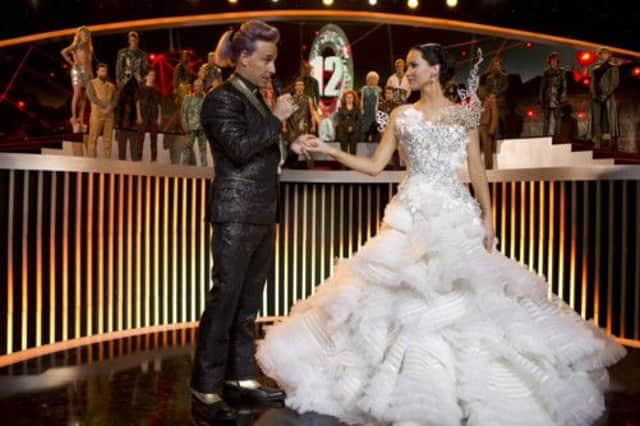Francis Lawrence on The Hunger Games: Catching Fire


Understandable, that is, to everyone but the film’s writer/director Gary Ross, who promptly declined to return for the sequel, Catching Fire, because he felt he wouldn’t have time to develop the dystopian fantasy series in the way that he wanted.
Luckily, Francis Lawrence – no relation to the film’s star Jennifer Lawrence – didn’t feel the same way. Having marshalled the similarly huge Will Smith blockbuster I Am Legend, the former music video director signed on last April in the full knowledge that he’d have just over a year to bring one of the most anticipated movies of 2013 to the big screen in a way that would satisfy both diehard fans of the books and those general cinemagoers who found themselves unexpectedly caught up in the hardscrabble world of Katniss Everdeen.
Advertisement
Hide Ad“It was definitely a case of hitting the ground running,” says Lawrence, “but I thought there was plenty of time. There was already a great book, so it wasn’t as if we had to re-invent it. Suzanne came from TV and writes with a very specific cinematic structure, so it was all laid out quite nicely. And while there was some new casting to be done, we weren’t creating the entire cast.”
Having been in the frame to direct the first film (“I was making another movie so I couldn’t do it”), the biggest challenge facing Lawrence was actually deciding whether or not there was enough space within the story for him to put his own stamp on the series. “Reading the book again, I saw there was still a lot of room to develop the characters. And the themes of the novel were really starting to come out. There were lots of new things to create too, like the Arena, aspects of the Capitol and seeing more of the districts.”
For those not yet au fait with The Hunger Games universe, Lawrence is referring to the post-apocalyptic world of Panem, a futuristic vision of America in which all the wealth is concentrated in one sprawling city (the aforementioned Capitol). The poverty-stricken masses, meanwhile, are confined to the 12 numbered districts that comprise the rest of the country and are kept in line with an annual reality show featuring randomly selected kids from each district being forced to compete against one another in a televised battle to the death.
As teen sagas go, then, it’s certainly meatier than the insipid Twilight franchise, and the sequel in particular doesn’t shy away from courting real world parallels, or dealing with weightier issues, such as the guilt Katniss feels at having taken life in order to save her own.
It’s something Lawrence wanted to carry over from the books, which Suzanne Collins was inspired to write after channel surfing between reality television shows and coverage of the war in Iraq. “She wanted to write a series of novels about the consequences of war and violence and she wanted to write it for teens,” elaborates Lawrence. “And I think the way she handled it, by not pulling any punches, really sold it to teens. She didn’t talk down to them and I’m trying not to either with this film.”
But if cinema based on young adult fiction comes of age with Catching Fire, the fact that it’s also built around a dramatically rich, self-possessed female protagonist also makes it seem more grown-up than a lot of adult-oriented mainstream cinema out there. “I think one of the appealing things about her is that the character is drawn in such a way that men and women can relate to her,” explains Lawrence of Katniss’s appeal. “She’s a great character full stop. She’s not great just because she’s a woman. She’s got strengths and she’s got flaws that allow you to buy into what she believes in. She’s just very human.”
Advertisement
Hide AdWhether possessive fans of the series will be quite as mature as the film when it comes to assessing every creative decision Lawrence has made is another matter. Lawrence, who would occasionally “take the temperature of the fans” by visiting online message boards during production, insists it’s comforting and energising to come on to a movie with a dedicated fanbase because he knows they’re going to show up to see it. But having previously felt the wrath of comic book geeks with his 2005 film Constantine, surely he must find it a little frustrating that some people are inevitably going to want the experience of reading the book replicated by the film.
“Yeah, although I wouldn’t say ‘frustrating’ because a lot of the time it’s like a 12-year-old girl or a 12-year-old boy somewhere who is in love with some scene or some line and it could be their favourite moment in the book. But the truth is, adapting 400 pages down to a two-hour-plus movie, there’s going to be some loss and what may work in a novel might not work in a movie.”
Advertisement
Hide AdThat should be less of an issue with Mockingjay, the concluding part of the saga. Following the example set by Harry Potter and Twilight, the final book in the series will be split into two movies, both of which Lawrence will direct. “That’s a way to get more in and that’s what’s exciting to me,” he says.
But does the story justify two more movies? “I haven’t had the full argument yet with someone making the case for the novel not being split,” says Lawrence. “I think, quite honestly, the fans of the book especially are going to get more of what they love by splitting the book into two movies. I think for those that haven’t read the book, what they’re going to get are two distinct stories and if they love it, they’ve got more to come and see. I think it’s only positive.”
• The Hunger Games: Catching Fire is in cinemas from Thursday. Follow Alistair Harkness on Twitter at @aliharkness